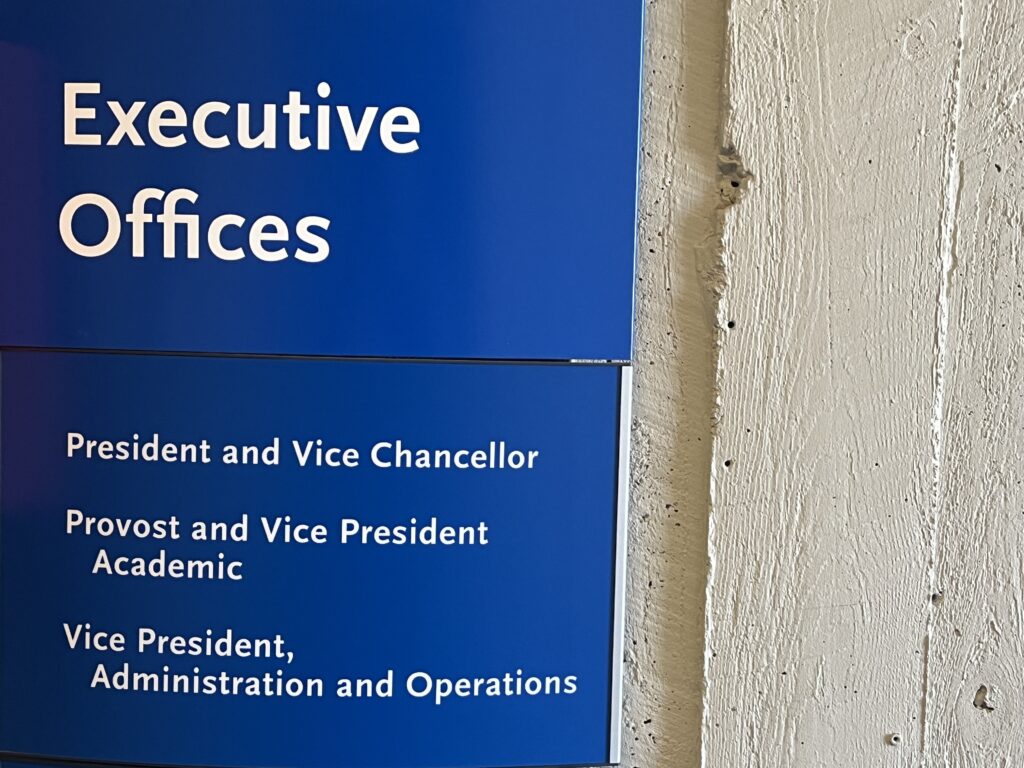
Listen to the whole story here:
Toronto Metropolitan University (TMU) is hosting virtual town halls this week, consulting with faculty and staff, as part of the search process for a new president. The virtual town hall with the TFA unionized employees went ahead on Monday, while the scheduled student-facing virtual town hall disappeared from the website.
The last time TMU chose a president was 10 years ago. Mohamed Lachemi was first appointed as interim president in October 2015, back when it was still known as Ryerson University. In March 2016, Lachemi officially became the university’s ninth president.
He is set to finish his term at the end of 2026, after the board approved an extension last fall. According to the Ontario Sunshine list, Lachemi is the highest-paid employee at TMU, bringing in a reported $457,570 in 2024.
The lengthy process of finding a new president comes at a time when Canadian universities are facing challenges from changes to immigration policy and stagnant funding, to precarious faculty employment.
In Ontario, the provincial government first froze domestic tuition rates in 2019, a move expected to last at least until 2027.
Ontario’s funding for post-secondary education institutions is “dead last in the country,” according to a 2024 news release from the Ontario Confederation of University Faculty Associations (OCUFA). In January 2024, the federal government introduced the international student cap to limit how many students (and their tuition) can enter the country and its post-secondary institutions. The cap would “certainly negatively impact universities,” said OCUFA executive director Jenny Ahn the following September.
But she said that the question that needed to be asked is, “Why are universities so reliant on international students in the first place?”
Because of this financial imbalance, Ontario universities and colleges have tuition revenue to cover most of their budgets. The presidential search committee is operating amid this context of financial strain and crisis in the post-secondary scene across Ontario.
“I think any incoming president of a university would have to be… working hard to make sure that the need for strong public funding of our public universities is front and center,” said Marc Schroeder, vice-president for the Canadian Association of University Teachers (CAUT).
So, how do universities choose a new university president? Schroeder said this process generally involves establishing a search committee, “ideally in cooperation with the university senate.”
He also explained how this process may vary according to different policies across universities. He said that some opt for a secret process while others pursue an open search, leading to an open finalist stage.
TMU announced the official launch of its search over the summer, saying the new president is expected to be announced by next fall, in 2026.
“This comprehensive process will involve consultation with the TMU community,” according to the Board of Governors website. OTR reached out to the Presidential Search Committee for comment, but did not hear back in time for publication.
Schroeder also noted, however, that some elements of this process are confidential.
“No one on the search committee should be leaking information about all the applications they’ve received,” he said. “But that doesn’t mean that everything that happens with respect to the search should be operating under a cone of silence.”
The community “should generally know the overall number of applications [the committee] received,” Schroeder said, and “whether a search firm is involved, these kinds of things.”
A few weeks ago, the website listed a virtual town hall scheduled each day to get input from a different group within the TMU community. Oct. 7 was presented as the opportunity for students to voice their thoughts, but then it was taken off the schedule without notice or explanation.
TMU’s Board of Governors website details a timeline with the stages of the presidential search process. After the consultation period ends in October, the Search Committee is set to update the Board of Governors and post the job posting. Applications will only be received and reviewed starting next February. Between then and April 2026, applicants will be interviewed.
After another update from the Search Committee to the Board of Governors in April, the Search Committee members present their top candidate for approval to the Board.
The webpage also includes the link to the president search consultation survey for community members to share their input “to help shape the position profile” for the university’s next leader. This seven-question survey will close by 9:00 p.m. on Oct. 24.
Lachemi spoke about his experience at TMU and the search for his replacement in an interview with OTR. “I also know that the next president will not only be focused on how we can and will respond to a changing world,” he said, “but they will also continue to challenge all of us – as is the TMU way – to think bigger and aim higher.”
“The president sets the tone for the institution,” Schroeder said. “Hiring the president is one of the most consequential decisions that will be made for TMU or any post-secondary institution for several years to come.”
Mariela Torroba Hennigen is a second-year Masters of Journalism student and a reporter for On The Record, fall 2025.
Otter.ai for generating transcripts for interviews. ChatGPT was used as a search engine to find sources to speak to, like the CAUT and OCUFA.

